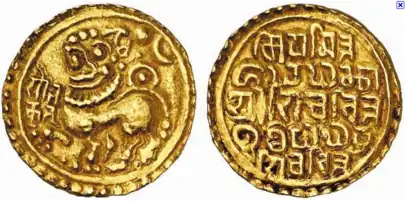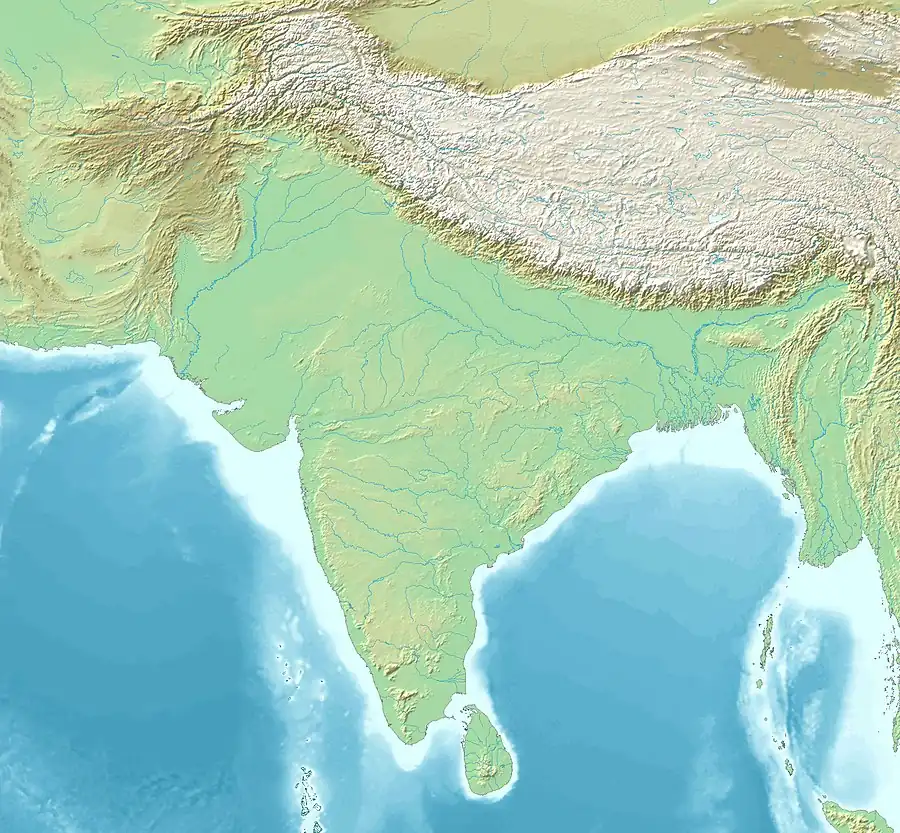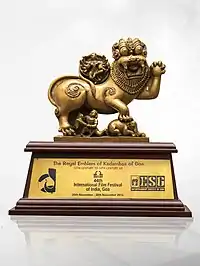Kadambas of Goa
The Kadambas of Goa were a dynasty during the Late Classical period on the Indian subcontinent, who ruled Goa from the 10th to the 14th century CE. They took over the territories of the Shilaharas and ruled them at first from Chandor, later making Gopakapattana their capital.[3]
Kadambas of Goa | |||||||||
|---|---|---|---|---|---|---|---|---|---|
| 960 CE–1310 CE | |||||||||
 Gold coins issued by the Kadamba king of Goa, Shivachitta Paramadideva, c. 1147-1187
| |||||||||
 ◁ ▷ | |||||||||
| Capital | Goa | ||||||||
| Common languages | Kannada | ||||||||
| Religion | Hinduism | ||||||||
| Government | Monarchy | ||||||||
| History | |||||||||
• Established | 960 CE | ||||||||
• Disestablished | 1310 CE | ||||||||
| |||||||||
| Today part of | India | ||||||||
| Kadambas of Goa | |
|---|---|
| Shashthadeva I(Kantakacharya) | 960 AD |
| Nagavarma | ~ |
| Guhalladeva I | ~ |
| Shashathadeva II | ~ |
| Guhalladeva II | 1038 AD |
| Veeravarmadeva | 1042–1054 AD |
| Jayakeshi I | 1050–1080 |
| Guhalladeva II alias Tribhuvanamalla | 1080–1125 |
| Vijayaditya I alias Vijayarka | Ruling prince up to 1104 |
| Jayakeshi II | 1125–1148 |
| Shivachitta paramadideva | 1148–1179 |
| Vishnuchitta alias Vijayaditya II | 1179–1187 |
| Jayakeshi III | 1188–1216 |
| Shivachitta Vajradeva | 1193–1202 |
| Sovideva Tribhuvanamalla | 1216–1238 |
| Shashthadeva III | 1246–1265 |
| Kamadeva(Husband of Kadamba princess Sovidevi) | 1265–1310 |
Origins
According to the Talagunda inscription found in Shimoga in Karnataka, the Kadambas are descended from Mayurasharma.[4]
Establishment of a separate dynasty
As a feudatory of the Chalukyas, Kadamba Shasthadeva was appointed as the Mahamandaleshwar of Goa by the Chalukya king, Tailapa II.[5] According to the Savai vere inscription, the Kadambas were allies of the Chalukyas, whom they helped to defeat the Rashtrakutas. Shashthadeva later conquered the city of Chandrapur from the Shilaharas and established the Goan Kadamba dynasty in 960 CE.[6]
Gopakapattana
King Shashthadeva conquered Goa, Port Gopakapattana and Kapardikadvipa and annexed a large part of South Konkan to his kingdom, making Gopakpattana his subsidiary capital. The next King, Jayakeshi I, further expanded the Goan kingdom. A Jain Sanskrit text, Dvayāśraya mentions the extension of his capital and that Port Gopakapattna had trade contacts with Zanzibar, Bengal, Gujarat and Sri Lanka. Gopakapattana was a pleasant commercial city, well connected with Old Goa and a trading hub for over 300 years. In the 1320s it was looted by Khalji general Malik Kafur. The Kadambas went back to Chandor, but returned to Gopakapattana when Muhammad bin Tughluq overcame Chandor.[7]
._%E2%80%98Conqueror_of_the_Malavas%E2%80%99_issue._Lion_standing_left%253B_standard_to_left_%C5%9Bri_malaha_ramari_in_Devanagari.jpg.webp)
Administration
During the rule of the Kadambas, the name and fame of Goapuri reached its zenith. Goa's religion, culture, trade and arts flourished and the dynasty built many Shiva temples. They assumed titles like Konkanadhipati, Saptakotisha Ladbha Varaveera, Gopakapura varadhishva, Konkanmahacharavarti and Panchamahashabda.[8] They married the royalty of Saurashtra and even local chieftains. The kings patronized the Vedic religion and performed major fire sacrifices (yagna) and Ashvamedha yagna. They popularized Hinduism and patronized Jainism.
The languages of Kadamba administration were Sanskrit and Kannada. They introduced the Kannada language to Goa, where it exercised a profound influence on the local language. The Nagari, Kadamba, Halekannada and Goykanadi scripts were very popular. It is known from another inscription that Tribhuvanamalla established a Brahmapuri at Gopaka. Brahmapuris were ancient universities run by Brahmins, where Vedas, astrology, philosophy, medicine, and other subjects were taught.[9] They were found in Goa, Savoi verem, Gauli moula, and elsewhere.
Kadambas ruled Goa for more than 400 years.[10] until 1345 CE.[11][12][13]

In popular culture
Goa Government-owned bus service is named after the Kadambas Dynasty and is known as Kadamba Transport Corporation. The royal lion emblem of the Kadambas is used a logo on its buses. The logo has been used since the corporation's inception in 1980.[14]
On 31 May 2005 Defence minister of India Pranab Mukherjee commissioned India's most advanced and first dedicated military naval base named INS Kadamba in Karwar.[15]
External links
References
- Chandra, Satish (2004). Medieval India: From Sultanat to the Mughals-Delhi Sultanat (1206-1526) - Part One. Har-Anand Publications. pp. 19–20. ISBN 978-81-241-1064-5.
- Schwartzberg, Joseph E. (1978). A Historical atlas of South Asia. Chicago: University of Chicago Press. pp. 32, 146. ISBN 0226742210.
- de Souza, Teotonio R. (1990). Goa Through the Ages: An economic history. Concept Publishing Company. pp. 11–15. ISBN 81-7022-259-1.
- George M. Moares (1931), The Kadamba Kula, A History of Ancient and Medieval Karnataka, Asian Educational Services, 1990, p10
- Moraes (1931), pp.88–93
- Kamat, Varsha (December 2010). Sanskrutik Vartapatra (in Marathi, see chapter: Kadambancha suvarnakal). Pune: Sanskrutik Vartapatra. pp. 112(see pages 10–13).
- De Souza, Teotonio R. (1990). de Souza, Teotonio R. (1990)Goa Through the Ages: An economic history pg 11-15. ISBN 9788170222590. Retrieved 8 January 2018.
- Gune, Vithal Trimbak (1979). Gazetteer of the Union Territory Goa, Daman and Diu. Vol. I. Goa, Daman and Diu (India). Gazetteer Dept.
- Gazetteer of the Union Territory Goa, Daman and Diu : district gazetteer / edited by V.T. Gune. Gazetteer of India. Gazetteer Dept., Govt. of the Union Territory of Goa, Daman and Diu. 1979. Retrieved 8 January 2018.
- De Souza, Teotonio R. (1990). Goa Through the Ages: An economic history, Volume 2. Concept Publishing Company. p. 129. ISBN 9788170222590.
- Title: Gazetteer of the Union Territory Goa, Daman and Diu: district gazetteer, Volume 1; Publisher: Gazetteer Dept., Govt. of the Union Territory of Goa, Daman and Diu, 1979 (Original from the University of Michigan, Digitised: 30 August 2008)
- "EPIGRAPHICAL AND LITERARY SOURCES ON WORSHIP IN GOA'S PAST" (PDF). ShodhGanga.
- Moraes, George M. (1990). K Kula Velliapura inscriptions pg 181 190 317 384. ISBN 9788120605954. Retrieved 8 January 2018.
- "Kadamba dynasty logo to be reinstaed on Goa govt buses". The Economic times. 24 April 2008.
- Defense Minister Pranab Mukherjee opened the first phase of India's giant western naval base INS Kadamba in Karwar, Karnataka state, on 31 May. "India Opens Major Naval Base at Karwar". Defence Industry Daily. 21 May 2012. Retrieved 30 January 2013.
